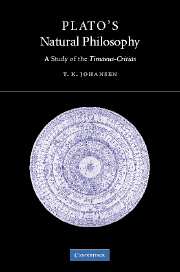Book contents
- Frontmatter
- Contents
- Acknowledgements
- Introduction: Plato's tales of teleology
- 1 What is the Timaeus-Critias about?
- 2 The status of the Atlantis story
- 3 The status of Timaeus' account
- 4 Teleology and craftsmanship
- 5 Necessity and teleology
- 6 Space and motion
- 7 Body, soul, and tripartition
- 8 Perception and cosmology
- 9 Dialogue and dialectic
- Epilogue
- Bibliography
- General index
- Index locorum
Introduction: Plato's tales of teleology
Published online by Cambridge University Press: 03 September 2009
- Frontmatter
- Contents
- Acknowledgements
- Introduction: Plato's tales of teleology
- 1 What is the Timaeus-Critias about?
- 2 The status of the Atlantis story
- 3 The status of Timaeus' account
- 4 Teleology and craftsmanship
- 5 Necessity and teleology
- 6 Space and motion
- 7 Body, soul, and tripartition
- 8 Perception and cosmology
- 9 Dialogue and dialectic
- Epilogue
- Bibliography
- General index
- Index locorum
Summary
The ancient covenant is in pieces; man knows at last that he is alone in the universe's unfeeling immensity, out of which he emerged only by chance. His destiny is nowhere spelled out, nor is his duty. The kingdom above or the darkness below; it is for him to choose.
Does the universe support our moral endeavours? Does the world, as we know it, give us reason to think that we will be better off, happier, more thriving, if we pursue a course of moral probity than if we do not? Does the universe make us feel at home as moral agents? Does goodness or beauty figure in the world independently of us? Can we learn something about how to live our lives from observing the universe? Many today would agree with Jacques Monod in answering ‘no’ to all of these questions. We live in an ‘unfeeling’ universe. The world is insensitive to our moral concerns. Values are mere human ‘constructs’, which the universe at best is indifferent to and at worst undermines.
Reading Plato we are brought back to a world in which the ‘ancient covenant’, the moral agreement between man and the universe, still holds. It is a tenet of Plato's thought that man is not alone in the universe with his moral concerns. Goodness is represented in the universe. We can therefore learn something about goodness by studying the cosmos. Cosmology teaches us how to lead our lives.
- Type
- Chapter
- Information
- Plato's Natural PhilosophyA Study of the Timaeus-Critias, pp. 1 - 6Publisher: Cambridge University PressPrint publication year: 2004



